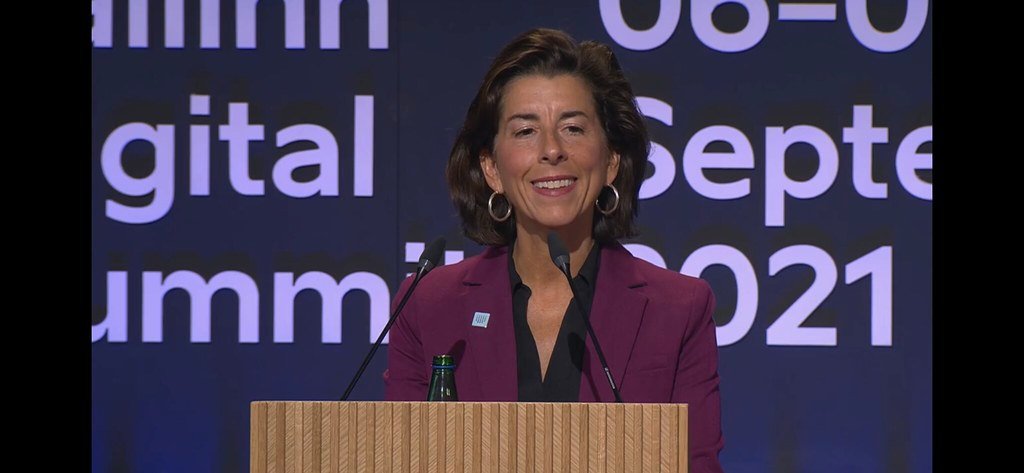U.S. Commerce Secretary’s Message to China: U.S. Business Patience Is Wearing Thin
The global economic landscape has evolved dramatically over the years. The relationship between the U.S. and China, two titans of global commerce, has been no exception to this flux. With mounting tension between these superpowers, U.S. Commerce Secretary Gina Raimondo’s recent comments on the state of the U.S.-China business landscape have garnered significant attention.
Raimondo, in a series of interviews, signaled growing frustration and concerns among American businesses operating in or with China. Her statement that the patience of U.S. business is “wearing thin” resonates with the increasing desire for equitable and predictable business environments.
A Historical Overview
Historically, the U.S. and China shared a robust trade relationship, each being the other’s most substantial trade partner. The dynamics have changed over time, however. Recent data suggests that the U.S. has now shifted more towards its immediate neighbors, Canada and Mexico, while China leans more into its Southeast Asian ties. This realignment of trade partnerships sheds light on the shifting priorities and, perhaps, the underlying tensions that have bubbled to the surface in recent times.
Raimondo’s Visit to China: A Mixed Bag
Raimondo’s recent trip to China gave her firsthand insights into the current landscape. While there, she recognized a palpable eagerness among U.S. businesses to maintain and strengthen their relationship with China. Many American companies have vested interests, deep-rooted partnerships, and long-term plans in China, emphasizing the importance of a stable environment.
Raimondo acknowledged some positive steps by the Chinese government. Yet, she emphasized that actions speak louder than words and that the on-the-ground reality must reflect the rhetoric.
In her conversation with CBS’s “Face the Nation,” Raimondo articulated her concerns. She said, “China is making it more difficult… I was very clear with China that we need to – patience is wearing thin among American business. They need and deserve a predictable environment and a level playing field. And hopefully, China will heed that message so we can have a stable growing commercial relationship.”
Her conversations in China, as she depicted them, were clear, direct, and firm. Raimondo did not mince her words, making it evident that the U.S. seeks transparent and equitable practices.
Emerging Challenges and Breaches of Trust
However, the complexities of the U.S.-China relationship don’t stop with trade dynamics. Raimondo highlighted fresh challenges faced by U.S. firms, including inexplicable hefty fines, abrupt raids on businesses, and amendments to the counterespionage law. Such unpredictable actions put American businesses in a challenging position and further strain the relationship.
An even more concerning event was the hacking of Raimondo’s email ahead of her visit to China. When she raised this issue with Chinese officials, their response was one of ignorance and denial of any intentional act. Regardless of its origin, such an incident underscores the challenges in fostering trust between the two nations.
Raimondo stressed, “It’s hard to build trust when you have actions like that.”
China’s Economic Challenges
The broader backdrop to these discussions is China’s economic situation. Global markets have been jittery due to the economic slowdown China is experiencing. One of the significant contributors to this is the debt crisis looming over the real estate sector, especially with giants like Country Garden.
Raimondo expressed her concerns over China’s economic trajectory, stating, “I think there’s no question that (China’s economy) is slowing down. And certainly, they’re having real, real significant challenges in the real estate sector.”
China’s economic health is intrinsically tied to its transparency and market orientation. Over the years, as China has leaned more towards a closed, opaque governance and regulatory model, it has seen challenges in its economic performance. Raimondo reflected on this, saying, “As they have closed down and become more arbitrary in the way they administer regulations, the economy is quite challenged.”
In Conclusion
The relationship between the U.S. and China is a multifaceted one. It’s filled with intricacies and nuances that shape the global business environment. While American businesses have an appetite for making this relationship work, the call for a predictable environment and level playing field has never been more pronounced.
Secretary Raimondo’s statements provide a snapshot of this evolving relationship, its challenges, and its potential. As both nations grapple with economic, political, and technological changes, the foundation of trust becomes paramount. Only time will tell how these two giants navigate their shared path forward, but one thing remains clear – the world watches keenly.
Read More:
